Chemical Peel
There are different types of chemical peels available, ranging from superficial peels that target only the outermost layer of the skin to deeper peels that penetrate more deeply. The specific type of peel recommended will depend on the individual's skin concerns and the desired outcome.
It's essential to have a consultation with a qualified professional before undergoing a chemical peel to determine the most appropriate treatment for your skin type and concerns. They will assess your skin, discuss your goals, and guide you through the process, including any potential risks and side effects associated with the procedure.
After a chemical peel, it's crucial to follow the post-treatment instructions provided by your healthcare professional to ensure proper healing and minimize the risk of complications. These instructions may include using gentle skincare products, avoiding sun exposure, and applying sunscreen regularly.
It's worth noting that chemical peels are not suitable for everyone. People with certain skin conditions, such as active cold sores, eczema, or rosacea, may not be suitable candidates for this procedure. Additionally, individuals who are pregnant or breastfeeding should consult with their healthcare provider before considering a chemical peel.
Overall, chemical peels can be an effective way to rejuvenate the skin and address various skin concerns. However, it's important to seek professional advice and guidance to ensure the procedure is done safely and tailored to your specific needs.

